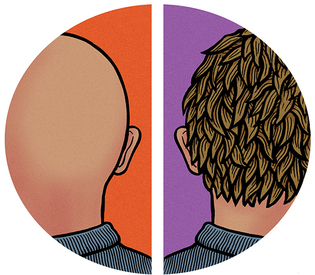
Gregory Nemec
As a basic exercise, Brett King ’05MD, associate professor of dermatology at the Yale School of Medicine, asks you to imagine waking up one morning missing an eyebrow. Three months later, you’re missing 80 percent of the hair on your scalp.
“You don’t recognize yourself, and others don’t recognize you,” he says. “Not only that, but everybody assumes you’re sick with cancer.”
King, who works on a number of severe skin disorders, says that alopecia areata, which is characterized by sudden hair loss, tends to be psychologically distressing for his patients. The disease takes place when cells in the immune system attack hair follicles, a process mediated by two proteins. It is diagnosed in over 200,000 people yearly in the US; one of them is Jada Pinkett Smith, whose baldness was the target of a joke by this year’s Oscars host, Chris Rock.
But recent work by King and a team of international researchers found that the common arthritis drug baricitinib sometimes treats alopecia areata very effectively. At the end of a 36-week trial, more than a third of the participants had regrown their hair on 80 percent or more of their scalp—an outcome “previously shown to be meaningful to patients,” King says. In many cases, the patients regrew all their hair.
King describes the results as “incredibly promising.” The proteins that lead to alopecia areata operate through what’s called the JAK-STAT signaling pathway, which is one of many pathways that cells use to communicate across their membrane. Baricitinib inhibits the pathway, blocking proteins from moving back and forth. And that’s it. “There’s no hand-waving involved,” King notes.
The study was part of a Phase 3 clinical trial, the final hurdle before a drug can be considered for FDA approval. The results held beyond 36 weeks and, in mid-June, baricitinib became the first FDA-approved drug for treating alopecia areata.
“This disease has long been described as cosmetic, but we’re dismantling that misconception. Hair is critically important to identity,” King says. “None of my patients are asking for better: they don’t want bigger, or curlier, or darker, or thicker hair. They just want normalcy restored.”
 loading
loading